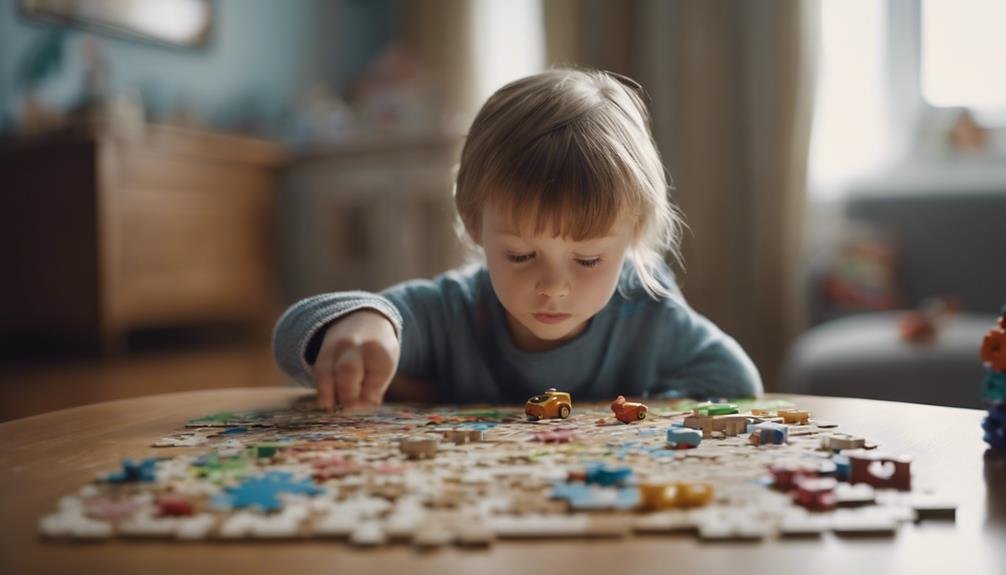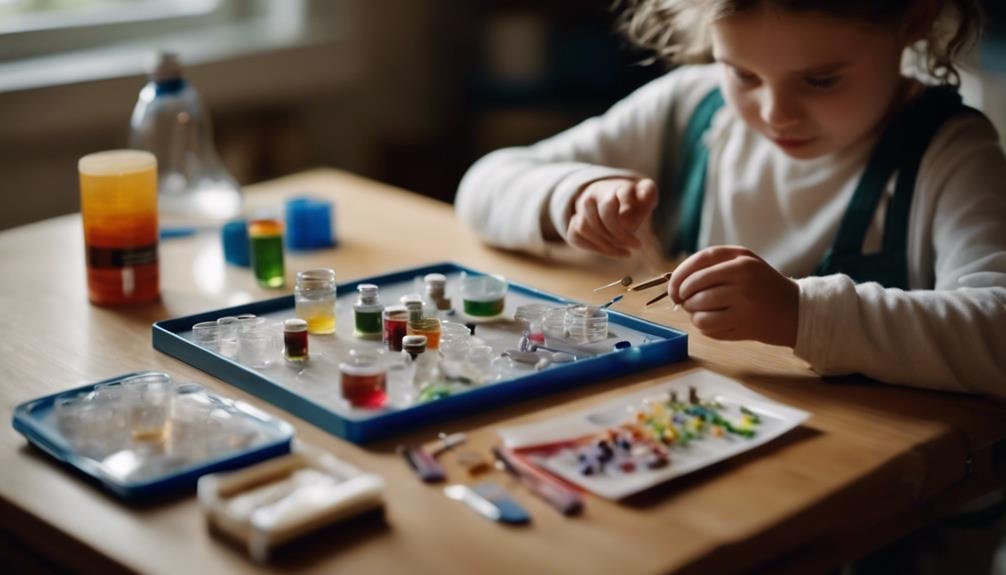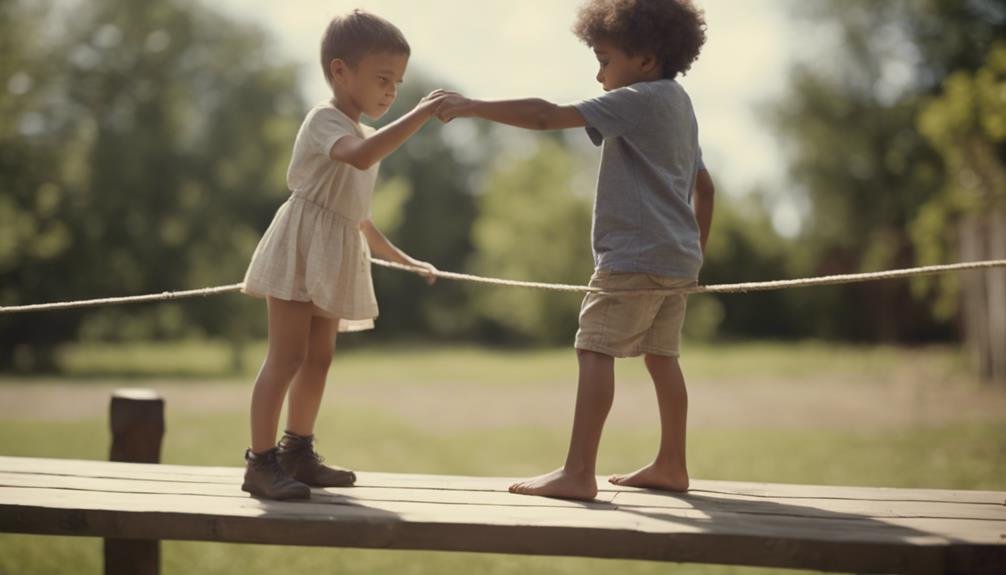"Cherishing Little Steps - A Haven for Baby and Family Journeys"
How to Support Your Gifted Learner in Early Childhood
As a parent, you are the first gardener of your child's potential, nurturing and guiding their growth.
But what if your little one shows signs of exceptional abilities early on? How can you make certain that their giftedness is supported and cultivated in their formative years?
The journey of fostering a gifted learner in early childhood is a unique one, filled with challenges and rewards.
Let's explore some key strategies that can help you navigate this path successfully and empower your child to reach their full potential.
Key Takeaways
- Early identification by parents and professionals is crucial for supporting gifted learners effectively.
- Provide tailored enrichment opportunities to nurture their interests and cognitive development.
- Encourage curiosity, exploration, and a growth mindset to foster intellectual growth and resilience.
- Advocate for appropriate support, resources, and social-emotional development for your gifted child.
Identifying Giftedness in Early Childhood

Identifying giftedness in early childhood often requires keen observation of a child's behaviors, abilities, and interactions with their environment. Early identification is important in providing appropriate support and opportunities for gifted learners. Parental involvement is key in this process, as parents are often the first to notice exceptional behaviors or skills in their children. They play an essential role in advocating for their child's educational needs and seeking out resources to nurture their potential.
Research suggests that early identification of giftedness can lead to better academic outcomes and social-emotional development for these children. By actively engaging with your child and encouraging their interests, you can help uncover their unique talents and abilities. Look for signs such as advanced language skills, curiosity, intense focus on specific topics, or a heightened sensitivity to their surroundings. Collaborating with teachers and professionals can also provide valuable insights into your child's strengths and areas where they may need additional support. By fostering a supportive and stimulating environment, you can help your gifted learner thrive in their early years.
Understanding Gifted Learners' Needs
To effectively cater to the needs of gifted learners, it is essential to comprehend the specific challenges and requirements that accompany their advanced abilities. Gifted learners often exhibit characteristics such as heightened curiosity, rapid learning pace, and intense focus. Understanding these traits is vital for providing appropriate support that nurtures their potential. Early intervention plays a significant role in maximizing the development of gifted children. By recognizing their needs from a young age, parents and educators can tailor interventions to foster their intellectual growth effectively.
| Gifted Characteristics | Parental Involvement | Individualized Support |
|---|---|---|
| Heightened curiosity | Active participation in | Tailoring learning |
| Rapid learning pace | educational decisions | experiences to meet |
| Intense focus | Regular communication | specific needs |
Parental involvement is key in advocating for the unique requirements of gifted learners within educational settings. Collaborating with teachers to create individualized support plans ensures that these children receive the challenges and opportunities they need to thrive academically and socially.
Providing Enrichment Opportunities at Home

Understanding the unique characteristics of gifted learners can guide you in creating enriching opportunities for them at home. Engaging your child in hands-on activities can stimulate their curiosity and foster a love for learning. Parental involvement is key in providing a supportive environment that encourages exploration and growth. By actively participating in your child's educational journey, you can tailor enrichment opportunities to their specific interests and needs.
Creative play is an excellent way to nurture your gifted learner's imagination and problem-solving skills. Encourage activities that allow them to think outside the box and express their creativity freely. Providing access to educational resources such as books, puzzles, and educational games can further enhance their cognitive development and academic abilities.
Encouraging Curiosity and Exploration
Encouraging curiosity and exploration in your gifted learner is essential for fostering their intellectual growth and development. Engaging in hands-on experiments can be a fantastic way to stimulate their inquisitive nature. Encourage your child to explore scientific concepts through simple experiments that they can conduct at home. This not only enhances their understanding but also nurtures their problem-solving skills.
Outdoor adventures provide another avenue for exploration. Nature offers a vast playground for learning. Take your child on nature walks, point out different plants and animals, and encourage them to ask questions. This kind of experiential learning can ignite a passion for discovery and instill a love for the environment.
Cultivating a Growth Mindset

Shifting from fostering curiosity to cultivating a growth mindset involves nurturing your gifted learner's belief in their ability to develop their skills through effort and perseverance. Developing resilience is key in this process. Encourage your child to view challenges as opportunities for growth rather than obstacles. Research suggests that when children embrace challenges, they're more likely to persist in the face of setbacks and develop a sense of mastery over time.
To cultivate a growth mindset, provide specific feedback that focuses on effort and strategies rather than innate abilities. This helps your child understand that improvement comes from hard work and dedication. Encourage them to set goals that are challenging yet attainable, fostering a sense of accomplishment when they overcome obstacles.
Fostering Social and Emotional Development
To promote the social and emotional growth of your gifted learner, fostering strong interpersonal skills and emotional intelligence is essential. Engaging in peer interactions helps develop social skills and empathy, vital for steering relationships and understanding others' perspectives. Teaching your child emotional regulation empowers them to manage their feelings effectively, fostering resilience and positive coping strategies. Here is a table outlining key strategies for fostering social and emotional development:
| Strategies for Social and Emotional Development | Description | Benefits |
|---|---|---|
| Encourage Peer Interactions | Promote social skills through play and communication | Enhances teamwork and cooperation skills |
| Teach Emotional Regulation | Help your child identify and manage their emotions | Improves self-control and coping mechanisms |
| Cultivate Empathy Development | Encourage understanding and compassion towards others | Enhances interpersonal relationships and kindness |
Building Strong Communication Channels

Fostering strong communication channels in early childhood for your gifted learner involves nurturing effective verbal and nonverbal interactions that lay a foundation for successful social relationships. Establishing open lines of communication can greatly impact your child's development and academic success.
Here are some key strategies to enhance communication within your family:
- Parent Teacher Partnership: Actively engage with your child's educators to create a collaborative environment that supports your child's unique needs.
- Empowering Conversations: Encourage your child to express their thoughts and feelings openly, empowering them to communicate effectively with others.
- Family Communication: Foster a supportive and understanding atmosphere at home where your child feels comfortable sharing their experiences and concerns.
Collaborating With Educators and Professionals
Establishing effective collaboration with educators and professionals is essential for maximizing support and resources for your gifted learner in early childhood. By actively engaging with teachers and specialists, you can benefit from professional guidance tailored to your child's unique needs. School collaboration allows educators to provide differentiated instruction and enrichment opportunities that align with your child's advanced abilities. Your involvement as a parent is important in advocating for appropriate educational provisions and ensuring your child receives the necessary challenges to thrive academically.
Moreover, collaborating with professionals such as psychologists or therapists can lead to valuable insights and therapy recommendations that support your gifted learner's social-emotional development. These experts can offer strategies for addressing potential challenges like perfectionism or asynchronous development, promoting a well-rounded approach to nurturing your child's talents.
Balancing Challenges and Support

Achieving a harmonious balance between providing challenges and offering support is essential for nurturing the growth of your gifted learner in early childhood. To create a perfect environment for your child, consider the following:
- Parental Involvement: Actively engage with your child's educational journey by communicating with teachers, participating in school events, and being aware of their progress. Your support and interest can have a major impact on your child's motivation and success.
- School Partnerships: Collaborate with educators to develop a tailored learning plan that meets your child's unique needs. Working together with teachers can make sure that your child is appropriately challenged and supported in the classroom setting.
- Individualized Learning: Advocate for individualized educational opportunities that cater to your child's advanced abilities. Tailoring learning experiences can keep your child engaged and continuously learning at a level that suits their intellectual capacity.
Celebrating Achievements and Progress
To effectively support your gifted learner in early childhood, it's important to acknowledge and celebrate their achievements and progress consistently. Recognizing milestones and showing appreciation for your child's accomplishments can have a significant impact on their self-esteem and motivation. By openly acknowledging their efforts, you're validating their hard work and dedication, which can encourage them to continue endeavoring for excellence.
Embracing accomplishments, both big and small, is key to nurturing your gifted learner's potential. Celebrate their successes, whether it's mastering a new skill, excelling in a particular subject, or showcasing creativity. Acknowledging their effort rather than just focusing on outcomes helps instill a growth mindset, teaching them the value of persistence and resilience.
Frequently Asked Questions
How Can I Help My Gifted Learner Develop Strong Time Management Skills at a Young Age?
To help your gifted learner develop strong time management skills at a young age, encourage task prioritization and goal setting. Foster self-directed learning and hold them accountable for their responsibilities. These practices can lay a solid foundation for effective time management.
What Are Some Effective Strategies for Incorporating Creativity and Artistic Expression Into My Gifted Learner's Daily Routine?
To infuse creativity into your gifted learner's day, prioritize artistic exploration and creative play. Encourage them to experiment with various art forms, provide ample supplies, and celebrate their unique expressions. Nurture their imagination and watch their talents flourish.
Are There Specific Ways to Foster a Sense of Community and Collaboration Among Gifted Learners in Early Childhood?
To foster a sense of community and collaboration among gifted learners in early childhood, encourage collaborative projects where children work together. Peer support helps build relationships, enhances learning, and boosts creativity. Creating a supportive environment promotes teamwork and social skills.
How Can I Support My Gifted Learner in Navigating the Potential Social and Emotional Challenges That May Arise From Being Academically Advanced?
To support your gifted learner in managing social and emotional challenges resulting from academic advancement, prioritize open communication, validate their feelings, encourage self-awareness, provide opportunities for peer interactions, and seek guidance from educators or counselors when needed.
What Role Can Technology Play in Enhancing the Learning Experiences of Gifted Learners in Early Childhood?
In early childhood education, technology integration offers personalized learning experiences for gifted learners. Digital resources provide interactive engagement, fostering critical thinking and creativity. Utilize these tools to nurture their talents and encourage exploration in a dynamic educational environment.
Conclusion
To support your gifted learner in early childhood, it's essential to identify their unique needs. Provide enriching opportunities, encourage curiosity, and cultivate a growth mindset. Maintain open communication, collaborate with educators, and find a balance between challenges and support.
By celebrating achievements and progress along the way, you can help your child thrive and reach their full potential. Embrace the journey of nurturing their giftedness and watch them soar to new heights.


